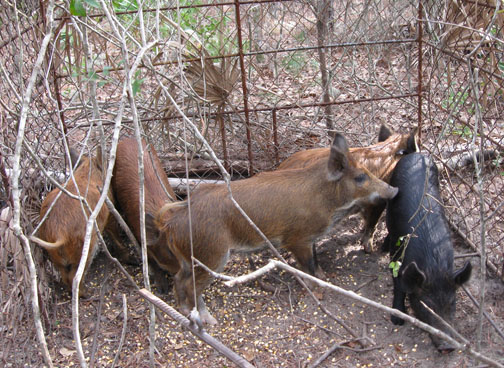
By Stan Kirkland, FWC
Feral or wild hogs have an incredible reproductive potential: A few hogs can quickly grow to several dozen. Although despised and unwanted by many land managers, there’s increasing evidence some people move hogs in violation of the law and without regard for the environmental consequences.
On May 6, a Walton County sheriff’s deputy saw vehicle tracks leading from Highway 20 into Eglin Air Force Base (AFB) property near Villa Tasso. He stopped and heard the sound of metal squeaking and then the squeal of pigs. Moments later, he stopped a truck coming out of the area pulling a livestock trailer. Inside the trailer, he found fresh hog feces.
The deputy contacted the Florida Fish and Wildlife Conservation Commission (FWC) and Officer Randall Brooks interviewed the trio. Brooks filed a report with the state attorney’s office and at this time charges are pending.
Justin Johnson is a wildlife biologist on Eglin AFB and works out of the Jackson Guard office. Johnson said wild hogs create problems for land managers that come with serious costs.
“For one thing, feral hogs compete with native wildlife, such as white-tailed deer, wild turkeys and gray squirrels, for mast such as acorns but they also have a side many people don’t see. They get into environmentally sensitive areas such as seepage slopes and steepheads and they root and destroy plants and animals that we’re trying to protect,” he said.
“Not only that, we’ve gone to considerable expense to stabilize some of the stream banks and road crossings here on the base but wild hogs will go after the sedges such as nutgrass that grow in these stabilized areas and they can destroy what you’ve done in nothing flat.”
Feral hogs that are found throughout the United States are the descendants of domestic hogs the Spaniards brought with them in the early 1500s. The hogs represented a reliable source of meat for the early explorers but the animals were often lost in travels overland, or in hostile conflicts with Native American tribes.
No one knows the exact number but there are believed to be a million or more feral hogs in Florida alone.
Sometimes people dump their farm-raised hogs on Eglin and other public lands. Johnson said they found and removed one of these animals from Eglin several years ago.
“I kid you not. It was red, stood as high as a man’s hips and probably weighed 600-800 pounds. It looked like something you would see in Iowa at the state fair,” he said.
Moving domestic hogs isn’t confined to Eglin AFB. During a hog-dog hunt on Aucilla Wildlife Management Area (WMA) in Jefferson County two weeks ago, hunters captured a 480-pound hog that appeared to have been moved directly from a farm to the public hunting area.
“We don’t know if this was an intentional release or an animal that escaped but it’s about five miles to the nearest dwellings from where this hog was caught,” said Clint Peters, an FWC wildlife biologist.
On WMAs in Northwest Florida, where there are persistent feral hog problems, hunters are allowed to hunt hogs during fall and winter hunts. The summer hunts with hog dogs are an effort to keep the hog numbers as low as possible.
